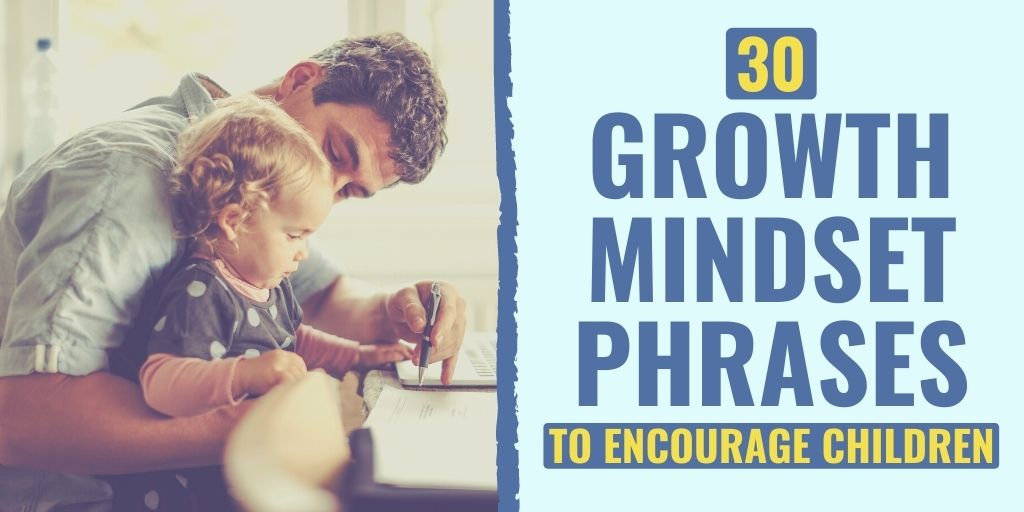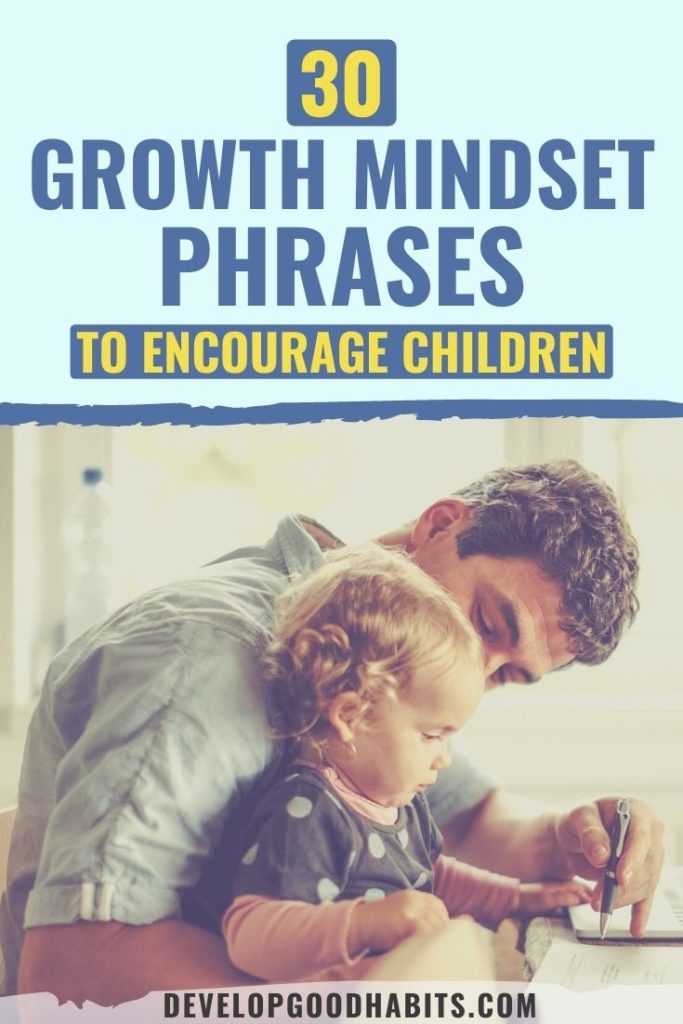When a child is born, they have a clean slate.
While they don’t know it yet, they’re faced with years of opportunity to create a fitting and unique life for themselves. Unfortunately, many of us don’t realize until much later in life just how much control we have over the directions of our own lives. Part of this is because we are stuck with a fixed mindset that dictates that failure is the end all and be all of any experience.
You know that your muscles grow and develop the more you challenge them–well, your brain goes through the same process. When you struggle to lift a weight, you’re setting your body up to build muscle. And when you’re struggling to grasp a concept or master a skill, you’re setting up your brain’s capability to adapt and grow in response to your efforts.
When this is taught to children, they can start to think of themselves as lifelong learners at a young age and not put a limit on their vision of success. So in this article, we will talk about some growth mindset phrases you can tell children to help encourage them to adopt this mindset. But first, let’s look at why it’s vital to help children develop a growth mindset.
Why Is it Important to Help Children Develop a Growth Mindset?
We can all choose to look at the world in one of two ways: a way that makes us feel happy and capable or makes us feel defeated and powerless. One of the greatest things you can instill in a child that will contribute to their happiness and success down the road is a growth mindset. With a growth mindset, children are confident in learning and engaging with the unknown.
Those with a growth mindset know that with hard work, they can improve at anything. Unlike a fixed mindset, a growth mindset encourages children to view failures as learning opportunities. When a child is raised with a growth mindset, they’re invited to thrive on challenges and to continue to stretch their abilities beyond where they stand today, which cultivates a love for learning.
Carol Dweck, a Stanford University psychology professor, developed the growth mindset concept. She posits that students who have a growth mindset—that is, students who believe that their intelligence is fluid—tend to be more successful in school than those who believe their intelligence is set at birth. By focusing on learning and creating a growth mindset environment for our kids, we can help them develop and reach their potential.
Because the language we use while talking to our kids has a profound impact on their attitude and mindset, let’s examine some growth mindset phrases you can use to encourage your children or students.
30 Growth Mindset Phrases to Encourage Children
1. “Well done. I noticed how hard you worked on that project.”
This statement focuses on praising a child’s process instead of their final product. Even if a child’s result isn’t perfect, praising them for their hard work and applaud them for learning along the way is best. The important thing is how a child approaches a challenge, not how successful they are.
2. “Let’s problem-solve together.”
Children may think that asking for help is a sign of weakness. However, offering support during a process when a child seems stuck can help that child come up with a solution instead of getting frustrated and giving up.
3. “You can do hard things.”
Children often shy away from trying things that seem too difficult. Encouraging children to try seemingly tricky tasks is a great way to show them they may be more skillful than they originally believed.
4. “What did you learn?”
Asking a child what they learned after an experience can help them reflect on what they could have done differently and what they will improve on moving forward. Reminding children of their consistent learning will also show them that they’re growing with each experience.
5. “Thanks for your effort on that task.”
Coupling value with a child’s effort instead of their results will start changing what the child views as being important. Over time, the child will start to appreciate perseverance over perfection, which can help children build the resilience that’s needed for their future success.

6. “You’re on the right track.”
This statement can encourage children who feel like they’re not getting anywhere when trying to finish a project or reach a goal. It confirms for them that they are making progress. This phrase helps cultivate a growth mindset because it helps children attribute success to their efforts rather than their abilities. They’re receiving praise for their work that’s been done so far.
7. “What went well?”
When helping kids reach their potential, it’s important to focus on the positives. Don’t just focus on what a child has done wrong and what needs to be changed. Consider what they did right and how they can translate that into other areas of the problem or even amplify that success in some way.
8. “I believe in you.”
While children may not believe in themselves, having an adult tell them that they have faith can encourage them to try. Supporting a child through their best efforts can motivate them to value perseverance and hard work.
9. “…yet.”
If a child says they can’t do something, it’s uplifting to remind them that they can’t do it yet. This doesn’t mean they can’t ever do it. The word ‘yet’ is mighty in fostering a growth mindset.
10. “It’s ok to make mistakes.”
Remind children that making mistakes is not only acceptable but encouraged. When children engage in a productive struggle, they learn. Children who know that it is okay to make mistakes approach challenges with confidence and are willing to take risks.
11. “Can we come up with a different strategy?”
If a child is struggling with a task, helping them troubleshoot their strategy can demonstrate that they can take a new approach to success. Children need to learn how to strategize so they look at problems from various angles and don’t give up when faced with failure.
12. “You have unlimited tries.”
If children know they can try as many times as they need, they’re more likely to brainstorm and be willing to fail a few times.
13. “Let’s do some brain training.”
Reiterating to a child that they can develop and strengthen their skills through practice by using this catchy rhyme can help them memorize the phrase and recall it later, reinforcing their belief in it.
14. “This task will take some time and effort to achieve.”
You can give a child a heads-up that a task will be challenging. This will help set their expectations appropriately and reduce the chance that they will give up if they aren’t immediately successful.
15. “Did you face any fun challenges today?”
Asking this question will encourage your child to perceive challenges as positive, inspiring them to seek out challenges and solve problems throughout the day.
16. “Everything is difficult before it is easy.”
This is a good reminder for children to practice something to improve their skills. If they look back on things they have improved upon in the past, it can provide good anecdotal evidence of the truth in this saying.
17. “Aim for progress, not perfection.”
Teach children that the goal is to get a little stronger each day. This can help simplify unachievable goals by focusing on the small efforts one can make today that will eventually lead to success.
18. “Your mistakes show me that you are trying.”
Children long for the approval of their parents and teachers. Praise the effort that your child is putting forth, no matter what the result is, to show your acceptance. By affirming that a child’s mistakes have a positive outcome, they will be more willing to make them.
19. “Your answer is correct. What strategy did you use?”
This helps children focus on the process rather than just the end result. It’s important for them to not only fix their mistakes but also reflect on what they did right.
20. “Let’s give each other feedback.”
You can help a child develop a growth mindset by offering honest feedback. However, don’t focus too much on what went wrong. Instead, emphasize how the child can learn from their errors so they don’t associate negative consequences with making mistakes. Please encourage them to give you feedback as well.
21. “It is ok to feel frustrated.”
When a child faces failure, it’s an excellent time to teach them how to dig deep to find their inner strength. Instead of simply saying it’s ok, validate their feelings of frustration and help them find comfort in the discomfort of failure. Meanwhile, encourage them to consider other strategies or solutions.
22. “You are improving, I can tell you’re practicing!”
Reinforcing the relationship between practice and improvement will help encourage children to have discipline and keep working toward their goals.
23. “Nice try!”
This phrase validates a child’s efforts–no matter the outcome.
24. “Great use of your resources!”
People with a growth mindset are not afraid to ask for help and understand that self-advocacy is essential to their future success. When children feel safe asking for help, they can make significant progress. With the right guidance, children can learn to sharpen their communication skills and confidently use their resources.
25. “I admire your patience.”
Working through failure can undoubtedly test one’s patience. While giving up is an easy way out that many people prefer to take, being persistent in solving a problem separates the high achievers from the rest of the bunch.
26. “How does it feel to be so close to reaching your goal?”
Asking this question will invite a child to stop and consider their feelings and sense of pride for their hard work. Sometimes, a little reminder of how far someone has come can motivate them to finish strong.
27. “I like your determination!”
Acknowledging a child’s determination to succeed can help them maintain positive energy.
28. “Think about where you were _____ ago, and look at you now!”
Whether it was a week or a year, this can help children reflect on their progress and maintain hope for their future success.
29. “Let’s reflect on what you did.”
When children take the time to reflect deeply on their experiences and challenges, they can identify gratifying experiences as well as things they may aspire to do differently in the future. Either way, this encourages children to focus on their process.
30. “What could you improve?”
Encouraging children to seek out areas that could use improvement will reinforce the importance of a process rather than just the outcome. Continuously doing this can instill a habit of continuous improvement.
Final Thoughts on Growth Mindset Phrases to Encourage Children
Your child’s growth mindset can decide between success and failure. The concept of a growth mindset encourages children to overlook the grief or discomfort associated with failure to gain enthusiasm about their future success. Using these phrases to instill a growth mindset will help your child become confident in their abilities and encourage them to keep trying instead of giving up.
More Lessons in Creating a Growth Mindset:
- 15 Growth Mindset Statements to Recite Daily
- 27 Habits to Develop the Growth Mindset in Your Life
- 13 Growth Mindset Videos for Kids to Watch on YouTube
- 27 Growth Mindset Coloring Pages for Your Kids or Students

Connie Mathers is a professional editor and freelance writer. She holds a Bachelor's Degree in Marketing and a Master’s Degree in Social Work. When she is not writing, Connie is either spending time with her daughter and two dogs, running, or working at her full-time job as a social worker in Richmond, VA.



